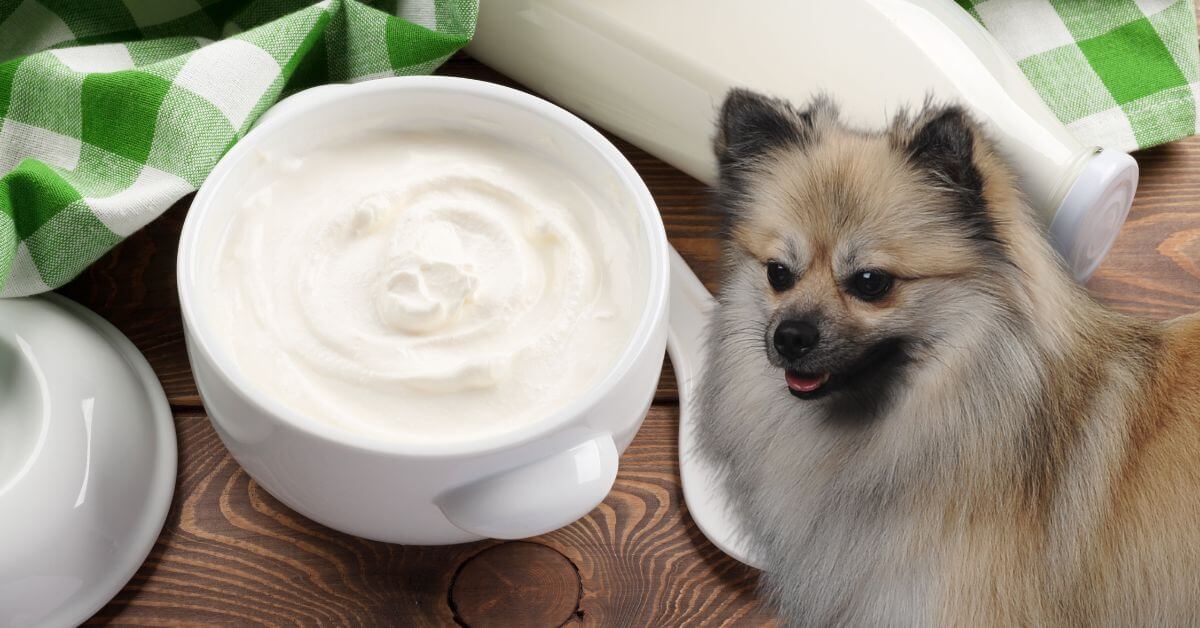Can Dogs Eat Sour Cream?
Dogs shouldn’t eat sour cream, as it’s high in fat, but a small amount is absolutely safe for your dog. Sour cream is not toxic for dogs, so they will be fine even if your dog ate an entire tub. It’s just high-fat dairy! However, eating too much sour cream can cause digestive issues like diarrhea and upset stomach, especially in lactose-intolerant dogs. If you’re having a snack with sour cream or using it as a topping for your cooked meals, it’s okay if your dog gets a little lick.

So, while dogs can eat sour cream without risks, avoiding high-fat treats is a better option. Sour cream is also low in lactose, so even if your dog is sensitive to lactose, they are going to be fine. Let’s explore some rare cases where you may notice some gastrointestinal upset!
Why is sour cream not recommended for dogs
Sour cream is safe for dogs, but it’s really not the best dog treat in the world. It’s high in fat, and fatty foods are not suitable for dogs. In the long run, too much fat can contribute to obesity. Also, many flavored sour creams have some herbs and spices that can upset your dog’s stomach. Here are some key points about sour cream to have in mind:
While it’s fine for dogs to have a small taste occasionally, it’s better to stick to treats that are specifically made for them.
The key takeaway
There are a few more things to say about sour cream and dogs. Understanding these can help pet owners make more informed diet decisions for their dogs.
By considering all of this, we can make better decisions for our pets’ health and well-being. If you do decide to let your dog have a small taste, make sure it’s plain and given in moderation. Remember, many healthier treats are specifically formulated for dogs, but this article was more about what to do in case your dog eats a ton of sour cream by accident because we all know that can happen!
Love, life, and fur forever!
FAQs
Is sour cream toxic to dogs?
No, absolutely not. Sour cream is not toxic to dogs, but it’s not the best treat for your dog due to its high fat and lactose content.
Can sour cream cause allergies in dogs?
Yes, some dogs can have allergic reactions to dairy products, including sour cream. Symptoms might include itching, skin irritations, or digestive issues.
What should I do if my dog ate a large amount of sour cream?
If your dog eats a large amount of sour cream, monitor them for signs of digestive upset, such as vomiting, diarrhea, or lethargy. If the symptoms don’t go away, call your vet for advice.
Can puppies eat sour cream?
Puppies have sensitive stomachs and are more likely to be lactose intolerant. It’s best to avoid giving sour cream to puppies and stick to treats specifically designed for their dietary needs.
Are there any healthier alternatives to sour cream for dogs?
Yes, there are many healthier alternatives, such as plain yogurt (in moderation), which contains beneficial probiotics. When possible, always choose options specifically formulated for dogs.
These are some of the most popular FAQs. If you have more questions, please leave a comment!